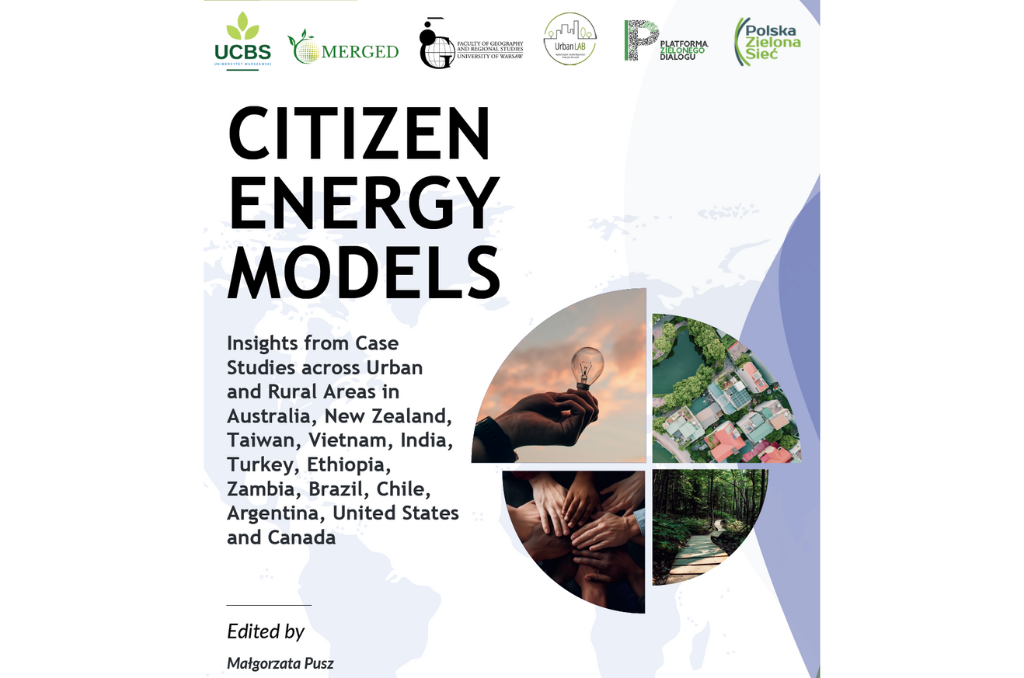New report „Citizen Energy Models” authored by the UCBS UW students

We are proud to present a report authored by students from Sustainable Development and Global Environment and Development (MERGED) programmes, which are both coordinated by the University Center for Environmental Studies and Sustainable Development (UCBS UW).
The publication titled „Citizen Energy Models” is the culmination of the Challenges of the Social Dimension of Sustainability course taught by dr Małgorzata Pusz of the Urban Research Lab (UrbanLab WGSR UW), a scientific unit at the Faculty of Geography and Regional Studies (WGSR) at the University of Warsaw.
Citizen energy is a model in which residents and local communities take an active role in the generation, distribution and consumption of energy, often using renewable sources. These models are rooted in the ideas of community involvement, decentralization, democratization, local empowerment and reinvestment of profits. They represent a form of energy democracy, a concept that emphasizes shifting the balance of power in the energy industry from corporations to citizens and from fossil fuels to renewable alternatives.
The report showcases 12 examples of energy cooperatives (Australia, Taiwan, Turkey, Ethiopia, Zambia, Brazil, Chile, Argentina, United States, Canada); two examples of citizen energy communities, as exemplified by the Community Trust Model and Charitable Trust (New Zealand), Community Solar Gardens (United States), and a local wind energy initiative (India); one example of individual and collective energy prosumption (Vietnam).
Full report can be found here
The team of 17 students come from 11 different countries: Belarus, Bhutan, Ecuador, Germany, India, Poland, Slovakia, South Africa, Turkey, United States, Vietnam. Collective effort was also supported by The Polish Green Network, a nationwide non-governmental organization acting for sustainable development and environmental protection.
Sincere congratulations to all authors: Julia A. Bartkowiak, Adrianna H. Błażek, Stefan Burkmann, Sara M. Chłodnicka, Pema Choden, Jakub J. Czekaj, Pamela N. Guijarro, Serra Güngör, Karol R. Kowalski, Wojciech P. Machynia, Ashvir Maharaj, Mária Motyková, Anish Muralidharan, Truc H. Pham, Anna J. Stachowiak, Maria J. Stodolak, Stanislau Trush.
The publication should be cited as:
The University Center for Environmental Studies and Sustainable Development (UCBS) (2025) Citizen Energy Models. Insights from Case Studies across Urban and Rural Areas in Australia, New Zealand, Tai- wan, Vietnam, India, Turkey, Ethiopia, Zambia, Brazil, Chile, Argentina, United States and Canada (Ed. by Pusz, M.).Warsaw: The University Center for Environmental Studies and Sustainable Development of the University of Warsaw (UCBS UW). ISBN 978-83-976197-0-8
The two-year masters course in ‘Sustainable Development’ and the two-year Erasmus Mundus Joint Masters course in ‘Global Environment and Development’ (MERGED), are run in collaboration with the Faculty of Geography and Regional Studies (WGSR UW) of the University of Warsaw (Poland). Students from the MERGED programme study at two out of three consortium universities: University of Warsaw (Poland), University of Copenhagen (Denmark) and University of Milan (Italy).
If you want to know more about the courses, click links below:
